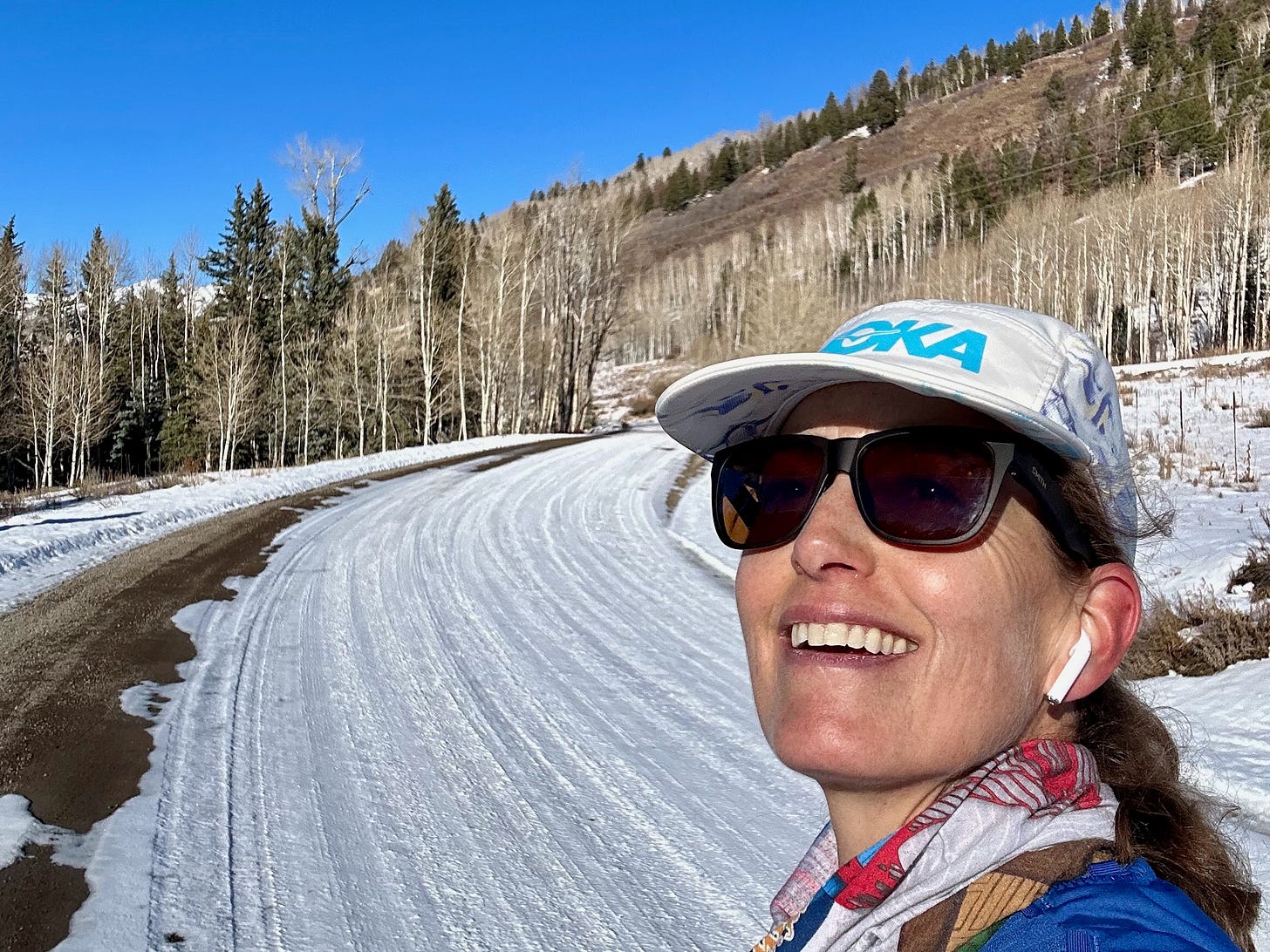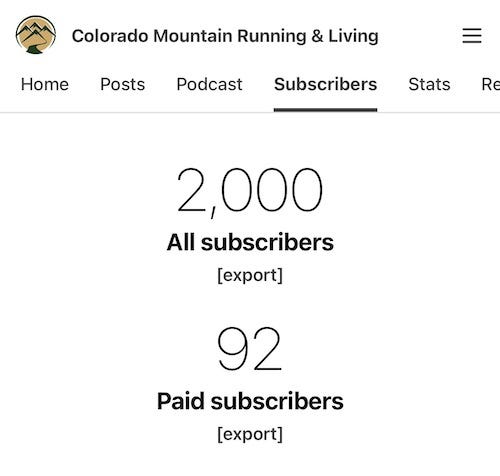Tomorrow (Thursday, December 14, at 5 p.m. Mountain), I’ll host the monthly Zoom for paid subscribers. This is a fun, casual chat where we get to know each other and discuss aspects of running, wellness, aging, and more. If you’d like to be a part of it, please upgrade your subscription to the supporter level.
What would make you whole?
Morgan sat at our kitchen island reading the news on his phone while I cooked dinner, and with forced casualness I asked, “So, what are your plans for 2024? Do you have any goals? Resolutions?”
Inwardly, I want him to join me at CrossFit. I want him to do at least the first week of Dry January. I want him to take up drawing or ceramics again.
“Nope,” he said, not looking up from his phone. “Resolutions are a you thing.” To further frustrate me but also make me laugh with his obstinacy, he deadpanned, “I have no goals.”
This is funny because he is one of the most successful and productive people I know. His accomplishments career-wise dwarf mine. He is too busy getting things done—throwing himself fully into developing ideas and completing tasks—to bother with goals or concern himself with self-improvement.
I let it go. We have been married for over 30 years because we are individuals who love and, for the most part, accept each other as we are. You do you he has told me before, and I need to remind myself of that.
I have a tendency to pester my husband and kids to do things that I want them to do, to try to change them in ways I believe would make them better and healthier. You need to cook and eat leafy greens. You need to update your LinkedIn. You need to start the morning or end the day reading a book. You need to take the clothes out of the dryer and fold them before they wrinkle. You need to raise your heart rate and break a sweat for 30 minutes at least three times a week. You need to floss your teeth and trim your toenails and put sunscreen on your neck. On and on.
I tend to tell them what they need to do when I’m feeling restless and not doing something that I need to do. Ironically, they do better—and sometimes wind up doing those good-for-them things—when I stop interfering and let them be.
Unlike my husband, I make goals (i.e. things I want to achieve) and resolutions (i.e. things I want to change or do differently), and this past year, I fulfilled them. I fully abstained during Dry January, read at least two books a month, ran at least 2000 miles during the year, increased strength and mobility work to at least twice a week year-round, practiced and improved my Spanish, traveled abroad, finished a 100-mile Hardrock qualifier, did an adventure run with friends, and stayed committed to this weekly newsletter.
Having accomplished those things, I feel proud—sort of. But if I’m honest, those resolutions and goals felt borderline routine. I’ve done the same things in prior years. I developed consistency and good health but didn’t actually stretch myself all that much.
I’m thinking about goals and resolutions not just because we’re approaching January 1, but also because I just finished a novel (the audiobook version) of Jodi Picoult’s Wish You Were Here. It’s a pandemic love story set in March of 2020 and captures the rawness of the first month of the shutdown, when the whole world changed and thousands died in New York City. The story popped me back into the mindset of the first months of 2020, during which our kids moved home from college, we all caught early cases of covid, Morgan was hospitalized for full-blown viral pneumonia and needed supplemental oxygen for a month, and I no longer could visit my mother in her assisted living.
Those intense, isolated, ill weeks forced us to gain a much clearer view of what matters most for a happy life: health, love, and relationships that are right here, right now. I and countless others began to live more in the present because we recognized that everything can change in a week and anyone can suddenly get ill and die. Our priorities shifted away from planning for the future—away from competing to win something, traveling to far-off destinations, or earning professional accolades. We were coping day to day and taking nothing for granted. But when life got back to normal and we returned to routines to be productive, earn money, and chase goals, that clarity for what most matters faded, along with the mindfulness to focus on and appreciate the present.
I was running the snow-covered dirt road a few miles from our house when the audiobook finished and the narrator read Jodi Picoult’s author’s note at the end. She wrote it in March of 2021:
“When I try to make sense of the past year, it feels to me like the world pressed pause. When we stopped moving, we noticed the ways we have chosen to validate ourselves—our lists of items or experiences we need to have; goals that are monetary or mercenary—and now, I’m wondering why those were ever even goals. We don’t need those things to feel whole. We need to wake up in the morning, we need our bodies to function, we need to enjoy a meal, we need a roof over our head, we need to surround ourselves with people we love. And we need to remember this, even when we’re no longer in a pandemic.”
Upon hearing those final words in her author’s note, I stopped in my tracks and pulled out my phone to open the Notes app. I felt slightly dizzy with the feeling of an “ah-ha” moment.
I dictated into my phone two questions that I want to force myself to answer and make a goal for the new year: What do you need to feel whole? What do you want to do before you die, in case you die next year?
Asking that of myself, I realize I actually feel close to “whole,” meaning satisfied and loved. I married my best friend, became a kick-ass athlete, raised and launched two exquisite human beings, traveled the world, built a dream home. What more do I need or want? Some of the things I tell myself are must-do goals, such as running the Hardrock 100 if I ever get into it, I don’t really need to do. I would like a grandchild to help raise someday, but that’s not my decision to make.
This realization of and appreciation for feeling nearly whole makes me turn outward and be less self-centered. One resolution for 2024 thus is to connect and give back—to my family, community, world. I want to make time to visit relatives and friends I don’t see enough; I want to sign up to substitute teach and volunteer more; I want to make a concerted effort to use fewer plastics and create less of an impact on the planet. In the face of politics, wartime conflict, and environmental change that make me feel hopeless and powerless, I want to do what I can to spread love and support others.
Still, something gnaws at me. Something I need to do to feel wholly whole. And it doesn’t have to do with running or house projects or learning a new skill or any of the other things I perennially do that might in fact add up to be a giant distraction.
I have stories in my head that I need to get out, stories built on memories that I don’t tend to share in my blogging. I would like to dissect and process those memories, and perhaps laugh and cry over them, to better understand where I came from and why I am the way I am. And, I hope these stories will entertain and move the readers, the way others’ memoirs do for me.
I love reading fiction, and I have tried writing fiction. But I haven’t found it in me—a journalist by training—to create something made-up. I always end up writing what I’ve observed, experienced, and know. Instead of making up characters and plots to tell a story based on these observations and experiences, I’d rather tell it how it happened from my point of view.
What I’m getting at is, I think it’s finally time to develop a memoir. I have tried in the past and stopped out of fear of what others, especially my loved ones, would think of it—of me. I want to shield my daughter and son from reading about how I really was and am, unless perhaps I succeed in making it funny, the way Matthew Perry was so funny in his memoir even when revealing his darkest shit.
Regardless of who reads it or whether it’s ever published, I want to write mainly for the process, to see where it takes me. And I think I may finally have a good handle on the structure—a double-timeline narrative arc. It’s time, my ideas feel ripe. It’s what I want to do to feel whole, before I die.
So my main resolution for the new year starting now is: make a commitment to write, revise, and organize these stories in my head to form a compelling narrative. Be as disciplined about writing as I am about running. Treat it like training for a 100-mile PR. My goal: have whole chapters and a proposal I feel comfortable and proud to present to someone else one year from now.
How about you—what would make you feel whole; what do you want to do before you die? Is it develop a big idea? Reconnect and reconcile with someone? Change where you live, what you do, who you’re with? Give something or someone up, or chase down what or who you always wanted? If you can answer, then maybe you’ll make your resolution.

I was going to do a followup Q&A to the one I did two weeks ago, answering some of your “ask me anything” questions, most of which have to do with training. But it feels like whiplash to go from the introspective personal writing above to a practical, advice-oriented section here. I’ll save your questions and answer them in a future post. Feel free to ask me anything, running-related or otherwise, in the comments below, on this chat thread, or by replying to this email if you’re reading the post in email form.
I’ll end with a few notes:
Congrats and bravo to my friend Sophie Speidel, who reads this newsletter, for setting a new 60-69 age group record at last Saturday’s Hellgate 100K. Having mentors and role models in this sport who are slightly older than I am is so important and motivating to me, and I try to fill that role for younger women. I wrote about Sophie, aging, and setting athletic goals later in life in this post, in case you missed it.
I love this article by Zoe Rom in Outside about the Taylor Swift Eras Tour Treadmill Workout. I was never a Swiftie but am starting to listen to her music and get into her lyrics while I run. I’m going to try this treadmill challenge as a winter indoor long run.
This past week, I hit 2000 subscribers, which is the milestone I hoped to hit by year’s end. Thank you so much for subscribing and reading. I hope you’ll consider sharing the newsletter on your social media or referring it to a friend.
If you would like to support my writing but would rather not commit to a paid subscription, please consider donating to this virtual tip jar.






This is so good. And mildly terrifying. I very much like the idea of the question "what makes you whole"--especially as I'm coming off an eight-month period in which I tackled a handful of different athletic challenges and am now wondering about the next goal. Maybe it's not a goal at all, but this other as-yet identified thing that makes me whole. But the second question--what do you want to do before you die, if you died tomorrow--is kind of terrifying. Sure, it's in our interest to remember we're mortal! But it's not a question I'm comfortable confronting head on--which doesn't mean I won't try to!
The other thing I wanted to say is that I happen to run a writing workshop in a place that's killer for trail running, in northern Greece, and there's always at least one memoirist in the group, hint hint.
Sarah, I really appreciate your honest, thoughtful writing. Thank you for sharing. I do think about how the pandemic brought our collective focus into the present, Professionally, I’m trying to grow and be a great leader to my team (most are much younger). I enjoy being a mentor. In my personal life, giving back and being present in my relationships are what I consider my most fulfilling goals. Big bucket ultras and exploring new natural places is a passion. I want to be able to continue to go at life like a great adventure while being a good human. Thanks again for sharing and best of luck with your memoir.